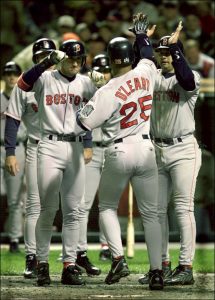
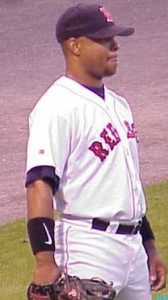
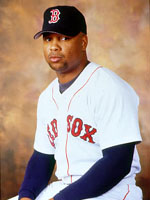 When the Boston Red Sox claimed Troy O’Leary on waivers from the Milwaukee Brewers in April 1995, it was the best thing that ever happened to his baseball career. Looking back during a recent interview, Troy said, “I didn’t think so at the time. I had been with the Brewers for eight years, my whole career. I had spent time in the majors, but I got caught in a numbers game, when the Brewers were trying to protect a younger player.”
When the Boston Red Sox claimed Troy O’Leary on waivers from the Milwaukee Brewers in April 1995, it was the best thing that ever happened to his baseball career. Looking back during a recent interview, Troy said, “I didn’t think so at the time. I had been with the Brewers for eight years, my whole career. I had spent time in the majors, but I got caught in a numbers game, when the Brewers were trying to protect a younger player.”
It almost seems that Troy O’Leary was fated to become a member of the Red Sox. As a senior at Cypress High School in Cypress, CA, O’Leary was a football all-star mulling scholarship offers when Milwaukee Brewers’ Director of Scouting Dan Duquette spotted Troy’s baseball potential. In 1995, when Duquette was the General Manager of the Red Sox, it took him about ten minutes to claim Troy from the Brewers.
“I was apprehensive about joining the Red Sox when they picked me up. They had guys you watched on TV like Roger Clemens and Mo Vaughn. And their fans were really passionate. I knew Boston was very different from Milwaukee.”
CYPRESS HIGH FOOTBALL ALL-STAR
Troy O’Leary was born in Compton, CA, on August 4, 1969, and he grew up in Compton with his mother Gloria O’Leary. When he was age 12, Troy went to live with his father, John O’Leary, in Cypress, CA, about 25 miles south of Los Angeles. “I made my father promise to take me to see my mother once a week,” Troy recalls, “and he kept that promise.”
Troy played all sports as a youngster but baseball was not his favorite. “I played whatever sport was in season,” he says, “but football was my first love.” Troy’s future appeared to be in football until a random encounter with Dan Duquette changed his fortunes.
Duquette was scouting top prospect Tom Redington of Esperanza High School for the Milwaukee Brewers. But the star of the game against Cypress High turned out to be Troy O’Leary. Duquette recognized O’Leary’s athleticism and assigned a scout to keep an eye on Troy.
“When I graduated from high school and the Milwaukee Brewers drafted me, I had a big decision to make,” he remembers. “Oregon State offered me a scholarship to play defensive back and Hawaii wanted me to play on offense.
“Both my parents were helpful. My dad was an air traffic controller so he evaluated all my options. And George Zabala, who had scouted me, really helped us to understand what might happen after I signed,” Troy emphasizes. “In the end I decided to sign with the Brewers because of the longevity baseball could offer and because there was less chance of injury.”
MINOR LEAGUE GEOGRAPHY LESSON
Troy O’Leary played eight seasons in the Brewers minor League system. He played as far north as Helena, MT, as far west as Stockton, CA, and as far south as New Orleans, LA. He was called up to the majors by Milwaukee and optioned back to the minors a total of 11 times. O’Leary had played well at every minor league stop, and he helped the Brewers, but he couldn’t move up on the depth chart.
Asked if he ever got frustrated, he answers, “The only time I ever got discouraged was my rookie year at Helena. I was young [17] and I wasn’t playing. I remember walking to the ballpark dragging my suitcase because I didn’t trust my hotel. I told my dad how I felt, and he said, ‘Son, let’s give it some time.’ It was good advice,” Troy agrees.
“Once I got playing time I improved. I hadn’t played a whole lot of baseball and at first everyone would shift left and move in because I didn’t have the strength to pull the ball,” he says. “I remember my mother sent me a tennis ball to squeeze and build up my forearms. Every winter I would work with George Zabala to improve my hitting and my power started to develop.”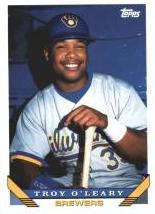
Troy O’Leary has positive memories of his two partial seasons, 1993 and 1994, with the Milwaukee Brewers. “It was great to play in the major leagues. I had good teammates and I remember Pat Litsach [Brewers’ infielder] went out of his way to make me feel comfortable. All of my major league firsts came with the Brewers.”
WELCOME TO BOSTON
Troy O’Leary may have been apprehensive about joining the Boston Red Sox but he found a home with the team and the city. Over the next seven seasons he played in at least one hundred games each season and hit ten or more home runs every year.
Asked if he was prepared for the intensity of Red Sox fans at Fenway Park when he joined the team in 1995, Troy O’Leary says, “I saw that intensity firsthand when we played the Yankees in spring training. The fans were really into it and I thought, ‘whoa we’re just in training to get ready to play.’ That prepared me for Fenway Park.”
After spending most of his career in left field, O’Leary quickly adjusted to playing right field for the Red Sox. He agrees there is a lot of territory to cover in Fenway’s right field area. “If a ball gets by you in right field in Fenway, it seemed like it could roll forever. At first I played fly balls cautiously but one night I charged, then held up to play the ball on a hop, with Roger Clemens pitching.
“Roger took me aside and told me, ‘The thing I hate most is those little flares over the infield that drop in. If you think you have a chance, I want you to lay out and go for it. If it gets by you, it gets by you.’ After that I got a little more aggressive.”
Troy O’Leary worked hard to become a solid defensive right fielder and to contribute to the Red Sox offense. But Troy would prefer to talk about the teammates that helped him become established. “A lot of guys helped me. And I should start with Kevin Kennedy [Red Sox manager 1995-96] who gave me my chance to play.
“Mo Vaughn helped me a lot with my hitting. It’s funny, when I would see Mo Vaughn before I joined the Red Sox, I used to think, man, he looks like a mean dude,” Troy chuckles. “But when we became teammates and I got to know him, it turns out he’s a pussy cat. We became close friends and we are still in touch.
“And Mike Stanley [former Red Sox catcher] taught me a lot about the overall game and life in the big leagues. We would sit together on every flight and talk,” Troy recalls. “He [Stanley] would have made a great manager.”
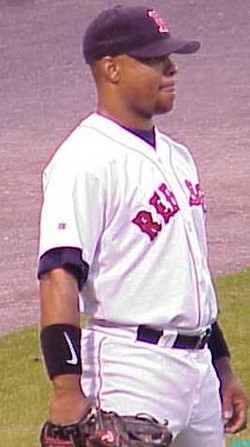
“YUMMY”
The Red Sox have had some great nicknames over the years. Ted Williams as “The Splendid Splinter” is iconic, and former shortstop Rick Burleson will always be “The Rooster.” But Troy O’Leary’s nickname of “Yummy” has to rank in the top ten among Red Sox nicknames.
“Mo Vaughn gave me that nickname. I have a sweet tooth and on the Brewers I was known as “Gummy Bear.” When we played the Brewers, Mo heard some of them call me that and he said “‘I don’t like that. We’re going to call you Yummy.’ It stuck and people still call me that,” Troy admits.
In 1998 O’Leary was shifted to left field and he thrived there. He agrees that left field in Fenway has less area, but it offers other challenges. “Playing the wall in leftfield is tricky, but Jim Rice was a big help. He worked with me for hours on how to play left field and he also helped me with my hitting.”
Troy singles out former teammate Reggie Jefferson for his help during their five years together with the Red Sox. “Reggie worked with me on my hitting every single day. We were competing for playing time and at-bats, so that’s the kind of thing you don’t forget.”
GAME FIVE: 1999 ALDS
The 1999 season was a “career year” for Troy O’Leary. His 28 home runs led the Red Sox, his 103 RBI ranked second, and his .495 slugging average was third on the team. And he shined defensively with a .993 fielding percentage, which ranked second among American League left fielders.
Looking back, Troy says, “I batted fifth in the lineup in 1999, and that was a good spot for me. It gave me a lot of chances to drive runners in. And John Valentine [Red Sox third baseman in 1999] really helped me to maintain my intensity in left field.”
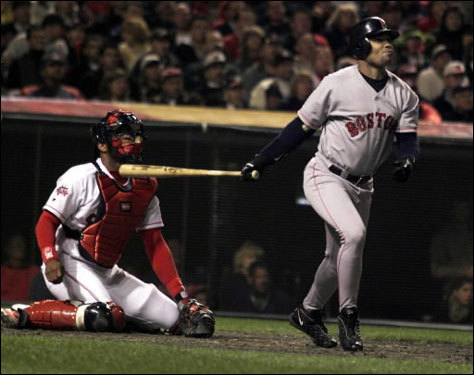
When Red Sox fans look back on O’Leary’s career, the game they remember best is Game Five of the 1999 ALDS against the Cleveland Indians. Both teams had won two games at home, and the fifth game at Jacobs Field in Cleveland determined the series outcome. Things looked grim for the Red Sox when the Indians jumped out to a 5-2 lead after two innings.
But the Red Sox scored a run in the top of the third, and after Nomar Garciaparra was walked intentionally to load the bases, Troy O’Leary hit the first pitch he saw from Charles Nagy for a grand slam home run and a 7-5 Red Sox lead. “I was determined to go after the first good pitch I saw and it worked out,” Troy says.
The Indians scored three more times in the bottom of the third for an 8-7 lead, but Pedro Martinez pitched six innings of hitless relief from the fourth inning on. After the Indians walked Garciaparra intentionally again in the seventh inning, Troy O’Leary launched a three-run homer that led to a series-clinching 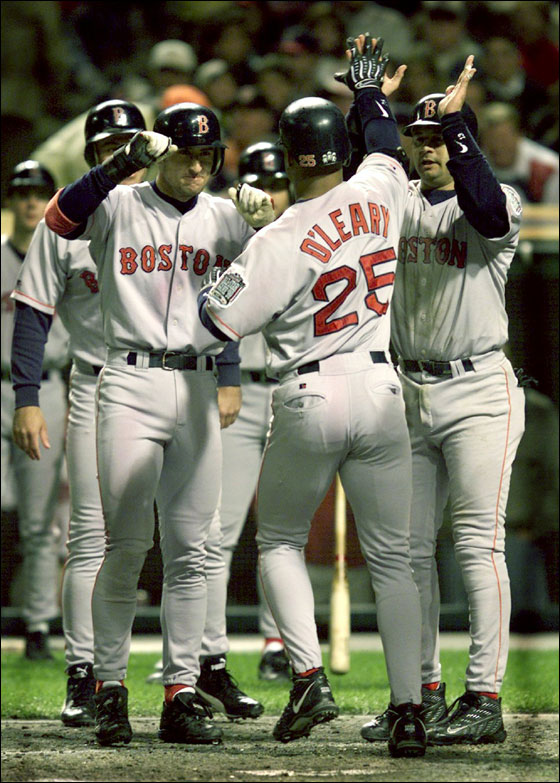
And how does Troy O’Leary account for one of the great power displays in postseason history? “Maybe it was the luck of the Irish,” he chuckles.
TROY O’LEARY TODAY
Troy O’Leary lives in Phoenix, AZ, with his two children from a prior marriage, son Trey who is 19, and his daughter Haylee who is 17. “I would like to get back into baseball at some point, but right now my priority is looking after my two children. I have full custody so it is a full-time responsibility and I love it. And I still have some time to play golf with my buddies like Kevin Young who played for the Pirates.”
Looking back on his seven seasons with the Red Sox, O’Leary says, “I really enjoyed playing and living in Boston.” How about highlights at Fenway Park? “Every time I ran out to my position in the outfield and I could hear fans calling my name was a highlight for me.
I lived on Beacon Street not far from the ballpark and my mother used to love to come and visit. She really liked the area. When my dad came to town I would take him around to the local places.
He loved that he could get a “Troy O’Leary Sandwich.”
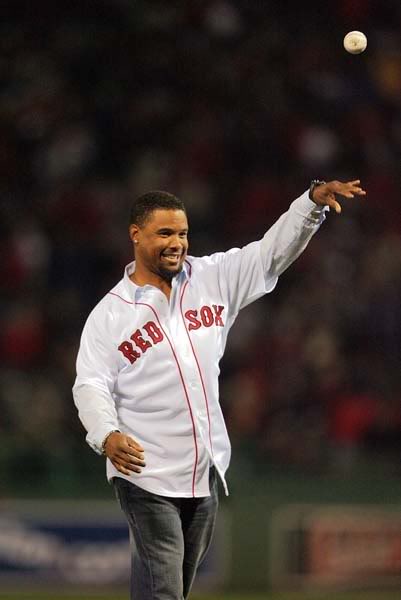
Troy O’Leary’s last visit to Fenway Park came in 2008 when he threw out the first pitch before Game Four of the ALDS. “I was a little nervous,” Troy says. “I had been away awhile and I didn’t know what kind of reaction the fans would have. But they gave me a great reception; they cheered me like a rock star!”
The Boston media often described Troy O’Leary as a man of few words. I found that Troy limits his words to those that really matter. For example, when I asked him if he had any message for Boston fans, Troy responded, “Please tell them thank you for me!”
Those seven words tell you a lot about Troy O’Leary.
Portions of this article originally appeared in Red Sox Magazine. To subscribe to Red Sox Magazine click here.


I just came across this article looking in search of some pictures of Troy O’Leary (my husband) from yesterdays ceremonial first pitch. I think this is an amazing article and just had to tell you thanks for representing him the way you did. He is a great man and thanks again!
Tammie oleary, those days were fun times. I’m proud of my lil bro. Your recall is spot on thanks.
Your brother is a great guy, when you talk to him tell him Lisa said hi, please
this is an amazing story, i love the whole family, and am blessed to have met them in my lifetime, the day john o’leary walked into my world, shocked that just by last name, i truly did know his sons name, and that i had baseball cards of him, thank you. god bless always……
One of my all time favorite Sox players! Guy was a clutch hitter. Wish he won a ring with us.
He was a great boxer when I was training him also!! Alot of people don’t know he can boxing like a champion for sure….. Great guy and friend!
Loved reading this article about my old friend who lived around the corner from me growing up in Cypress. Great guy and I am so proud of all his successes.
Troy was my favorite Red Sox player growing up. I used to send out an email after every game called the TOLU (Troy O’Leary Update)…I drove all my friends crazy.
Thanks for this great write-up!